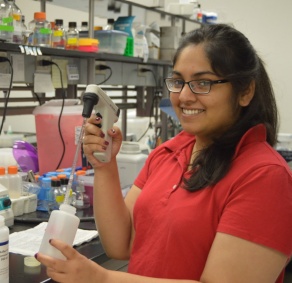PhD in Biological Sciences
Our PhD program is a comprehensive, research-oriented program involving foundational coursework and an original dissertation research project mentored by one of our faculty. By working closely with this research advisor and members of a dissertation committee, students become independent scientists positioned to assume leadership roles in their chosen profession

Program Features
- Nationally recognized program: Our program is ranked in the top 10% of programs by research expenditures by the National Science Foundation and in the top quartile in terms of faculty quality and student experience (according to the National Research Council).
- Interdisciplinary training: Research in the department spans the breadth of biology, from molecules to populations. In this environment, students are trained to draw connections and examine living systems at all levels of complexity.
- Superior training culture: PhD students work closely with mentors and committee members in a supportive, rigorous research environment.
- Full financial support: All PhD students are supported with a combination of renewable teaching and research assistantships. Support also includes tuition scholarships.
- Training beyond the laboratory: The program teaches grant-writing, public speaking, and classroom instruction, ensuring you are well prepared to succeed after graduation.
Program Requirements
Course Requirements
As a foundation for advanced research, PhD candidates complete 22 credit hours of coursework in their first two years in the program. Courses cover advanced topics in the biological sciences and teach critical thinking, analysis of primary scientific literature, and experimental design.
Seminars
To develop oral presentation skills, PhD candidates enroll in a seminar course each semester of their first two years. Each student presents two seminars. PhD candidates also attend the departmental seminar series, featuring distinguished scientists from inside and outside the university.
Rotations
In the first year, PhD candidates perform two or three 10-week research rotations prior to joining a laboratory and embarking on a thesis project. Rotations consist of small research projects that are designed to introduce the student to research opportunities available in that laboratory.
Candidacy Exam
At the end of the second year, PhD candidates take a candidacy exam consisting of two parts. For the written exam, each student prepares an original research proposal on a topic of their choosing. For the oral examination, the dissertation committee questions the student about the research proposal and about foundational knowledge in the sub-discipline the student has chosen for their dissertation research.
Research Experience
After successful completion of the candidacy exam, the student focuses on an original research project under the supervision of a faculty mentor. Regular meetings with the PhD Advisory Committee provide additional guidance and support.
Dissertation
Upon the completion of the research project, the student prepares a dissertation, which is read and evaluated by the PhD Advisory Committee. The student also presents the research results publically in an hour-long seminar.
